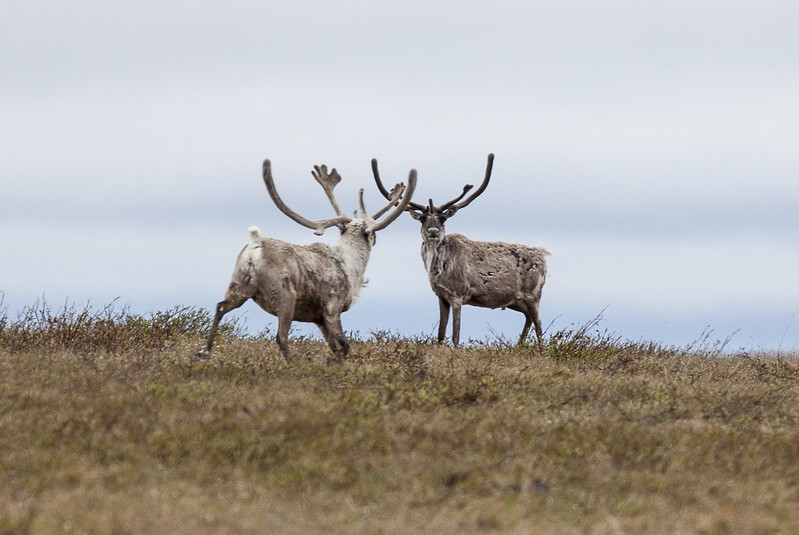
You can’t duct tape the climate crisis. Biden agency must say no to Willow oil and gas project
UPDATED: The Alaska office of the Bureau of Land Management announced on Feb. 3 that it will open a 30-day public comment period on the Willow oil and gas proposal. The comment period will close March 9.
“We’re glad that people can now give input on the effects this destructive oil and gas industrialization project would have on people, animals, Alaska’s western Arctic and the climate,” said Bridget Psarianos, staff attorney with Trustees for Alaska. “Courts shut down this project because of inaccurate and inadequate analysis of climate impacts, and other major flaws in the environmental review. We’re certain that if the U.S. Bureau of Land Management thoroughly engages the public and uses legitimate science to do a thorough and up-to-date analysis of impacts and alternatives, then the only right conclusion to reject ConocoPhillips’ requests for permits.”
Here are some Alaska groups with information about how to contribute your views during the comment period:
What went down so far on Willow in 2022?
Trustees for Alaska and 12 other Alaska and national groups submitted a comment letter on Feb. 2 urging the Biden administration live up to its climate and biodiversity promises by rejecting ConocoPhillips’ request for permits for the destructive Willow oil and gas proposal.

The letter makes three key points:
- The Biden administration has skipped a critical process for public engagement and for understanding impacts.
- The Willow project would undermine Biden’s climate goals and promises.
- The Willow project would endanger Arctic communities, wildlife and the planet.
It concludes that the only U.S. Bureau of Land Management action that fulfills the administration’s commitments to science-based decision making, the protection of biodiversity, and addressing the climate crisis is to reject permits.
Don’t skip steps to meet industry deadlines
After the courts concluded in August 2021 that Trump-era authorizations for the ConocoPhillips’ Willow proposal broke the law, the Biden administration immediately began working to supplement its previous flawed analysis without doing a scoping period — the first step of an environmental review under the National Environmental Policy Act. This process is meant to determine the scale and impacts of a proposed project and identify significant issues that require in-depth analysis.
It also allows the public to offer the agency valuable input.
The scoping process should not be skipped to fulfill ConocoPhillips’ desires to have permits in hand by next winter. BLM should not prioritize ConocoPhillips’ profits at the expense of the people, land, and animals who will be harmed.
President Biden, keep your climate promises.
Willow would spew out massive amounts of carbon pollution in the Arctic and around the world with harmful consequences to people and animals. Based on ConocoPhillips’ estimates, the project would produce 260 million metric tons of greenhouse gases over its lifetime – more carbon than 56 million cars emit in a year.

This would cause devastating and potentially catastrophic consequences to Arctic animal behavior, hydrology, permafrost, and subsistence hunting. BLM is obligated by law to look not only at the effects of Willow on climate change, but also at the implications of climate change on the environment and, indeed, the future.
The effects of climate change are already dire in Arctic communities. Climate effects like fish, bird and marine animal die-offs, the loss of food access and food sources, the need to move entire villages due to coastal erosion, sea level rise and extreme storms, and infrastructure damage and loss due to erosion and permafrost thaw already cause cultural, financial, and public health harm.
The Willow proposal would dramatically escalate a feedback loop that increases these impacts.
Oil and gas industrialization harms Arctic communities and the planet
The community of Nuiqsut already suffers the health consequences of nearby oil and gas exploitation, and Arctic communities already endure the escalating impacts of climate change.
Siqiñiq Maupin, executive director of Sovereign Iñupiat for a Living Arctic —the lead client in the lawsuit we won—explained in a earlier press release how the continued push for Arctic oil extraction perpetuates injustice.
“We have experienced rising health issues, and the dismantling of traditional practices and food sources because of oil extraction and industrialization on the Arctic Slope,” she said. “We have experienced the silencing and paternalism of public agencies that are supposed to listen to us fully, to understand and take into consideration our concerns, and to protect the health and well-being of all of us, not just the profit interests of corporations. We need the exploitation of the Arctic to stop, and the prioritization of our health and well-being to begin again.”
The project would further endanger the health and survival of threatened Southern Beaufort Sea polar bears and an array of animals like caribou, migratory birds, and marine mammals, whose biodiversity and species’ health sustains an interconnected system of Arctic life.
The ConocoPhillips’ Willow proposal does not belong in the western Arctic or our climate future.


